Has a sports injury left you suffering from a torn or ruptured ACL? Are you unable to participate in activities you love due to the instability, pain, and risk of damage associated with an ACL injury? Do you want to return to playing sports but don’t know where to find the best ACL surgeon in Delhi to repair your knee? If so, you’re not alone. ACL injuries are prevalent, but with the proper surgical treatment and rehabilitation, you can return to an active lifestyle. In this comprehensive guide, we address all your concerns and questions regarding ACL reconstruction surgery and how to find the best ACL surgeon in Delhi to get you back in the game. Written with care and empathy by healthcare experts in Delhi, it provides insights into the latest ACL repair techniques, recovery, success rates and how renowned orthopaedic surgeon Dr Kunal Aneja can help you regain the strength and stability of your knee. Read on to learn all about ACL injuries and why Dr Kunal Aneja is considered the best ACL surgeon in Delhi today.
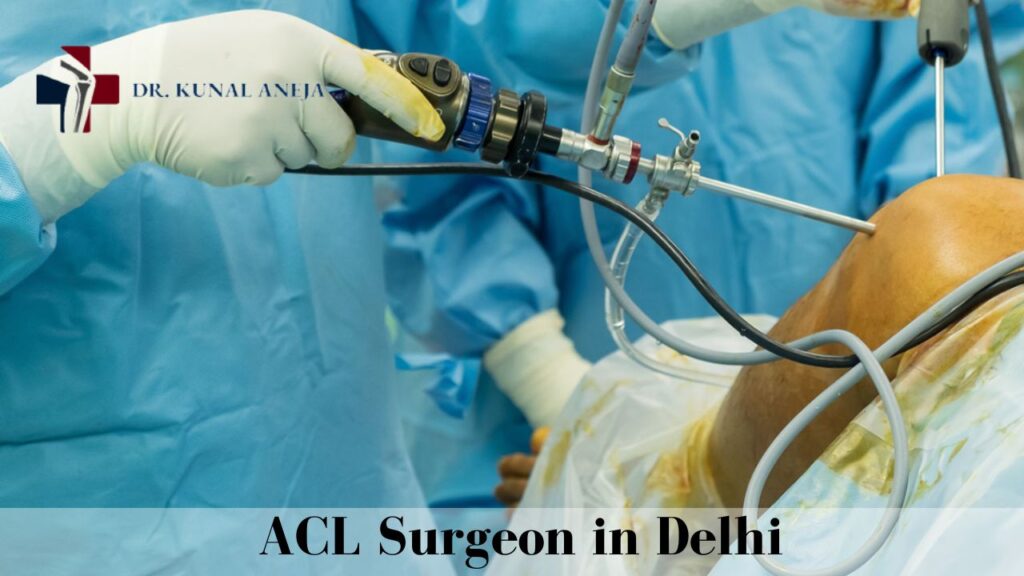
What is the ACL, and what does it do?
The ACL, or Anterior Cruciate Ligament, is a vital structure within the knee joint that plays a crucial role in maintaining stability and supporting movement. This ligament is one of the four major ligaments in the knee and serves as a connector between the thigh bone (femur) and the shinbone (tibia). Its primary functions encompass the following:
- Stabilization: The ACL prevents excessive forward movement of the tibia to the femur, contributing to the overall stability of the knee joint.
- Rotational Control: It aids in controlling rotational movements of the knee, ensuring smooth and controlled motion during activities like walking, running, and jumping.
- Weight Distribution: The ACL assists in distributing the body’s weight evenly across the knee joint, reducing undue stress on other structures.
- Impact Absorption: During sudden stops or changes in direction, the ACL absorbs the impact forces, safeguarding the knee from potential injuries.
- Coordination: It works with other ligaments and muscles to maintain proper alignment and coordination of the knee joint, allowing for efficient movement.
Injury to the ACL can lead to instability, pain, and restricted mobility. Surgical intervention, like ACL reconstruction, is often necessary to restore optimal joint function and help individuals regain their active lifestyles. The expertise of an experienced orthopaedic surgeon, like Dr Kunal Aneja, is essential for successful ACL surgery and rehabilitation.
How does an ACL injury occur?
An ACL injury typically occurs due to sudden and forceful movements that strain or tear the Anterior Cruciate Ligament (ACL) within the knee joint. The injury mechanisms can be categorised as follows:
- Non-Contact Injuries: These occur during activities without direct collision, often involving sudden changes in direction, pivoting, or landing from a jump. The ACL can become stressed when the knee is rotated or twisted while the foot is planted.
- Contact Injuries: Direct impact or collision, such as a blow to the side of the knee, can also lead to ACL injury. Sports like football, soccer, and basketball are standard settings for contact-related ACL injuries.
- Deceleration Injuries: Abruptly stopping or slowing down while running can generate excessive stress on the ACL, mainly if the body’s weight is not evenly distributed.
- Hyperextension: When the knee is forcefully straightened beyond its normal range of motion, it can strain or tear the ACL.
- Landing Incorrectly: Awkward landings after a jump, especially with improper knee alignment, can place undue stress on the ACL.
- Twisting Motions: Sudden twisting or rotation of the knee while the foot is fixed on the ground can cause the ACL to stretch or tear.
Factors like poor conditioning, inadequate warm-up, muscle imbalances, and previous knee injuries can increase the risk of ACL injury. Engaging in proper sports techniques, conditioning exercises, and wearing appropriate footwear can help prevent these injuries.
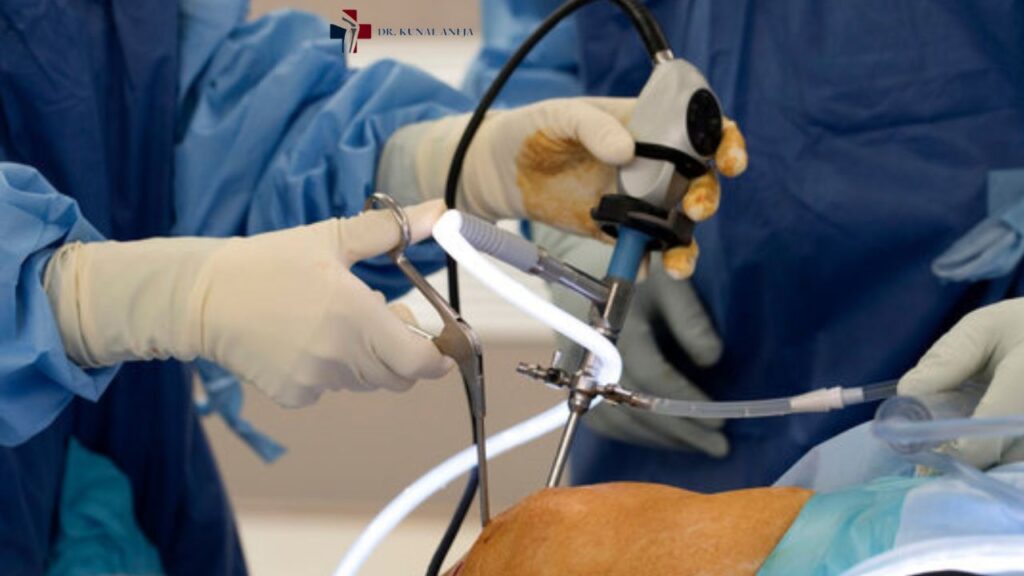
What are the symptoms of an ACL tear?
An ACL tear is often accompanied by distinct symptoms that signal potential damage to the Anterior Cruciate Ligament within the knee joint. These symptoms can manifest immediately or gradually:
- Audible “Pop” Sound: Many individuals report hearing a noticeable popping sound at the time of injury, which can signify the tearing of the ACL.
- Pain: Sudden and intense pain often follows the injury, emanating from the knee’s interior.
- Swelling: The knee swells rapidly due to internal bleeding and inflammation caused by the torn ligament.
- Limited Range of Motion: The ability to fully extend or flex the knee might be compromised, and stiffness can ensue.
- Instability: A sense of the knee “giving way” or feeling unstable, especially during weight-bearing activities, is a standard indicator of ACL tear.
- Difficulty Walking: Walking might become difficult due to pain and instability, leading to a noticeable limp.
- Reduced Strength: The affected leg may feel weaker than usual, impacting activities that involve pushing off or lifting.
- Bruising: Bruising on the knee or lower thigh might develop due to bleeding from the torn ligament.
- Inability to Continue Activity: If the injury occurs during physical activity, individuals may find it impossible to continue due to pain and instability.
- Tenderness: Touching or pressing the area around the ACL might elicit tenderness.
It’s important to note that these symptoms can vary in intensity depending on the severity of the tear. Consulting a medical professional, such as Dr Kunal Aneja, is crucial to accurately diagnose the extent of the injury and determine the appropriate course of action for treatment and recovery.
How is an ACL tear diagnosed?
Diagnosing an ACL tear involves a combination of medical evaluation, physical examination, and diagnostic imaging to assess the extent of the injury accurately. Dr Kunal Aneja employs a comprehensive approach to ensure an accurate diagnosis:
- Medical History: Understanding the circumstances of the injury, the symptoms experienced, and the patient’s medical history provides important context.
- Physical Examination: Dr Aneja conducts a thorough physical examination to assess knee stability, range of motion, and areas of tenderness. Lachman and anterior drawer tests are commonly used to determine ACL integrity.
- Imaging Studies: X-rays are initially performed to rule out fractures and evaluate bone structure. MRI (Magnetic Resonance Imaging) is then used to visualise soft tissues like ligaments, helping to confirm ACL tears and identify associated injuries.
- Assessment of Laxity: The degree of knee instability is evaluated through specific manoeuvres during the physical examination, providing insights into the severity of the ACL tear.
- Comparison with Uninjured Knee: Dr Aneja often compares the injured knee with the uninjured knee to assess differences in the range of motion, stability, and other physical characteristics.
- Secondary Injuries: A thorough assessment is vital since other injuries, such as meniscus tears or collateral ligament damage, can sometimes accompany ACL tears.
Dr Kunal Aneja’s expertise and commitment to accurate diagnosis ensure that patients receive the appropriate treatment plan tailored to their condition. His holistic approach addresses the immediate injury and the broader aspects of joint health and mobility.
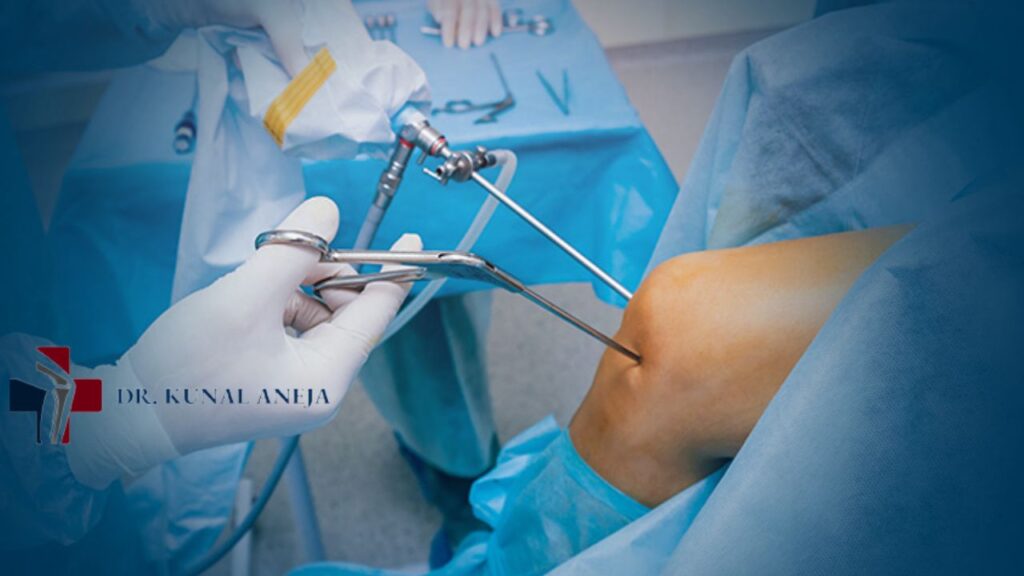
Do all ACL tears require surgery?
Not all ACL tears require surgery; the decision depends on various factors, including the individual’s age, activity level, overall knee stability, and the extent of the tear. Dr Kunal Aneja adopts a personalised approach to determine the best course of action:
- Non-Surgical Treatment: Partial tears or cases where the individual’s lifestyle doesn’t demand intense physical activity may be managed with non-surgical methods. Physical therapy, strengthening exercises, and bracing can help stabilise the knee and restore functionality.
- Surgical Intervention: Complete ACL tears, particularly in active individuals or athletes, often benefit from surgical reconstruction. This restores knee stability, reduces the risk of further damage, and supports a return to sports and active lifestyles.
- Patient Preference: Dr Aneja values patient input in decision-making. Factors like the patient’s goals, concerns, and preferences play a significant role in the treatment plan.
- Associated Injuries: If there are other knee injuries, like meniscus tears, that require surgical intervention, it might influence the decision to perform ACL surgery concurrently.
Dr Aneja’s expertise ensures patients receive individualised recommendations based on their unique circumstances. Whether surgical or non-surgical, his goal remains consistent: optimising joint health, restoring mobility and enhancing the overall quality of life.
What are the different types of ACL reconstruction surgeries?
Indeed, here are the different types of ACL reconstruction surgeries presented in a tabular format:
| Type of ACL Reconstruction Surgery | Description |
| Autografts | In this approach, the surgeon harvests a graft from the patient’s own body, commonly from the patellar tendon, hamstring tendons, or quadriceps tendon. Autografts are often preferred for their potential to integrate well and minimise the risk of rejection. |
| Allografts | Allografts involve using a graft from a donor, typically a cadaver. These grafts are pre-processed and available in tissue banks. Allografts are advantageous for shorter surgical times and reduced donor site morbidity, but may have a slightly higher risk of failure. |
| Bone-Patellar Tendon-Bone (BPTB) | This autograft involves using a segment of the patellar tendon along with bone plugs from the patella and tibia. BPTB grafts offer excellent stability but can cause anterior knee pain in some patients. |
| Hamstring Tendon | The surgeon harvests tendons from the hamstring muscles to create the graft. This approach is associated with less post-operative pain and a faster recovery, but might result in slightly less stability compared to BPTB grafts. |
| Quadriceps Tendon | Utilizing the quadriceps tendon and a part of the patella, this graft type offers a good balance between stability and reduced pain compared to BPTB grafts. |
| Double-Bundle ACL Reconstruction | This advanced technique involves reconstructing both the anteromedial and posterolateral bundles of the ACL for improved rotational stability. It’s typically employed in athletes or patients with complex knee instability. |
| Anatomical ACL Reconstruction | Focuses on replicating the natural attachment points and orientation of the ACL fibres, enhancing overall joint stability and reducing potential postoperative complications. |
Dr Kunal Aneja’s expertise in ACL surgery enables him to choose the most suitable technique for each patient, ensuring optimal outcomes and rapid postoperative recovery.
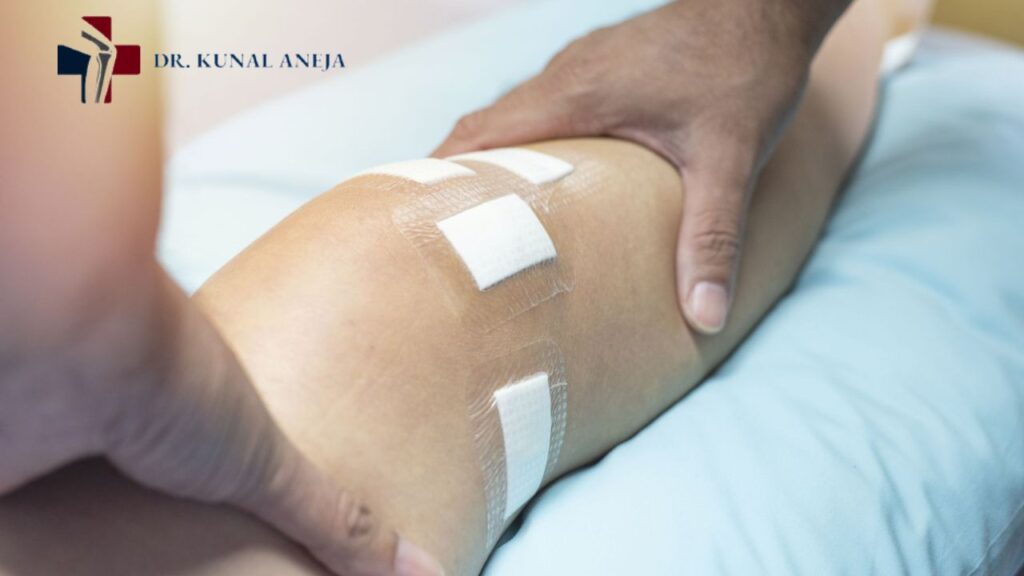
What grafts are used in ACL reconstruction surgery?
ACL reconstruction surgery employs various graft options to replace the torn anterior cruciate ligament. Dr Kunal Aneja offers a range of graft choices based on individual patient needs and preferences:
- Autografts: These grafts are sourced from the patient’s own body. Common autograft choices include:
- Bone-Patellar Tendon-Bone (BPTB): Using a segment of the patellar tendon with bone plugs from the patella and tibia.
- Hamstring Tendons: Harvesting tendons from the hamstring muscles for a less invasive option with reduced postoperative pain.
- Quadriceps Tendon: Utilizing the quadriceps tendon and a portion of the patella, balancing stability and pain reduction.
- Allografts: These grafts come from a tissue donor, often a cadaver. Allografts can include patellar, hamstring, and Achilles’s tendons, pre-processed and available from tissue banks.
- Synthetic Grafts: While less common, synthetic grafts from polyester or polyethylene terephthalate can be used. These grafts are designed to provide stability without relying on biological tissue.
Dr Aneja’s expertise ensures that the most suitable graft is chosen based on the patient’s age, activity level, and joint health. He aims to optimise joint stability, restore function, and enhance the overall quality of life for each patient undergoing ACL reconstruction surgery.
What does ACL reconstruction surgery involve?
ACL reconstruction surgery is a meticulous procedure to replace a torn or damaged anterior cruciate ligament (ACL) within the knee joint. Dr Kunal Aneja, with his expertise, executes this surgery with precision and care:
- Graft Harvesting: The surgery begins with a graft harvest, typically from the patient’s body (autograft) or a donor (allograft). Familiar graft sources include the patellar tendon, hamstring tendons, and quadriceps tendon.
- Preparation of Graft: The harvested graft is carefully prepared to match the dimensions of the original ACL. This involves removing excess tissue and shaping the graft to fit the knee’s anatomy.
- Surgical Incisions: Small incisions are made around the knee to access the joint. Arthroscopic instruments are employed to visualise and assess the extent of the tear and any associated damage.
- Tunnel Creation: Tiny tunnels are drilled into the tibia and femur bones to mimic the original attachment points of the ACL. These tunnels act as anchors for the graft.
- Graft Insertion: The graft is inserted into the tunnels and secured in place with screws, pins, or other fixation devices. The graft’s placement replicates the original ACL’s role in stabilising the knee.
- Rehabilitation Plan: A rehabilitation plan is initiated post-surgery under Dr Aneja’s guidance. Physical therapy helps regain strength, mobility, and stability while protecting the healing graft.
Dr Aneja’s surgical finesse and patient-centred approach ensure that each step is tailored to the patient’s specific condition and needs. The goal is to restore knee stability, enable a safe return to activity, and enhance overall joint function.
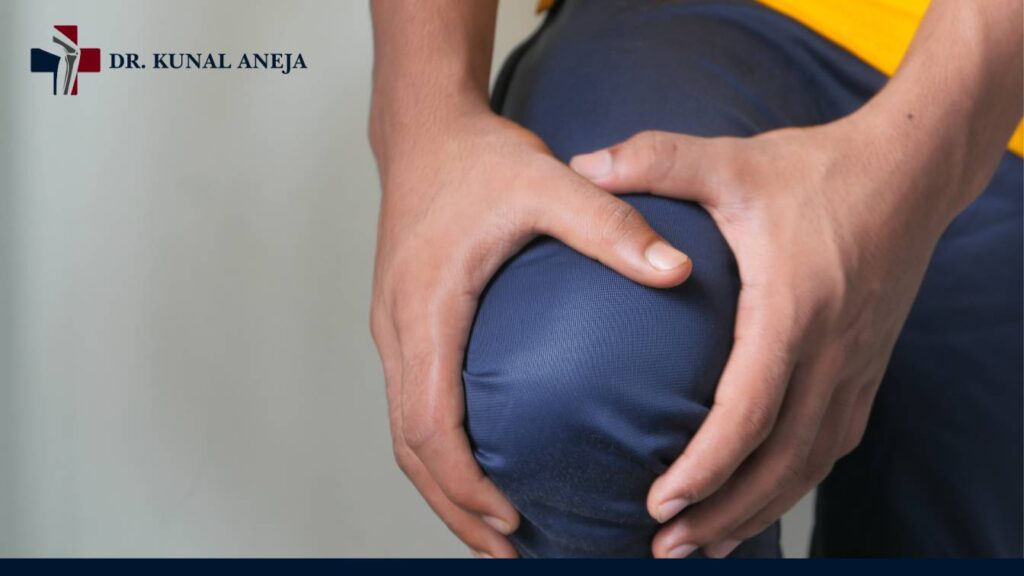
How long does it take to recover from ACL surgery?
Recovery from ACL surgery is a gradual process that involves several stages, with individual timelines varying based on factors such as the patient’s age, overall health, surgical technique, and adherence to rehabilitation. Dr Kunal Aneja meticulously oversees the recovery journey:
- Initial Days: The immediate post-operative phase involves managing pain, swelling and regaining a minimal range of motion. Crutches might be used for support.
- First Few Weeks: Patients usually begin physical therapy to restore full knee range of motion, strengthen muscles, and work on walking without assistance.
- 4-6 Weeks: Gradual progression in weight-bearing activities is allowed. Strengthening exercises intensify to restore muscle balance and joint stability.
- 2-3 Months: Many patients can resume low-impact activities like stationary cycling and swimming. Agility drills and light jogging might begin under Dr Aneja’s guidance.
- 4-6 Months: More dynamic activities and sport-specific exercises are integrated. Dr Aneja monitors progress and ensures the knee is ready for a safe return to sports.
- 6-12 Months: Depending on the individual’s progress, a return to competitive sports is feasible, with continued strengthening and regular follow-ups with Dr Aneja.
Dr Aneja’s comprehensive rehabilitation plan and personalised guidance aid in expediting recovery while minimizing the risk of complications. Patience and adherence to the recovery plan are crucial for achieving optimal results and restoring full joint functionality.
What is rehabilitation like after ACL surgery?
Rehabilitation after ACL surgery is a structured process aimed at restoring strength, stability, and functionality to the knee joint. Dr Kunal Aneja tailors each rehabilitation plan to the patient’s specific needs, facilitating a successful recovery:
- Immediate Post-Surgery: Focuses on managing pain, reducing swelling, and achieving initial knee range of motion through gentle exercises.
- Early Phase (Weeks 1-6): Intensive physical therapy aims to regain full knee extension, strengthen quadriceps and hamstring muscles, and improve walking patterns.
- Intermediate Phase (Months 2-4): Emphasises muscle strengthening, dynamic stability exercises, and controlled weight-bearing activities. Balance and proprioception training play a role in joint control.
- Advanced Phase (Months 4-6): Sport-specific drills, agility training, and progressive weight training are introduced, targeting functional movement patterns.
- Late Phase (Months 6-9+): Focuses on preparing the patient for a safe return to sports or high-demand activities. Exercises mimic sports motions and involve more complex movements.
Throughout rehabilitation, Dr Aneja monitors progress, adjusting the plan as needed. Patient compliance, dedicated physical therapy, and regular follow-ups are essential for optimal outcomes. Dr Aneja’s expertise ensures that the rehabilitation journey is practical and aligned with the patient’s goals, enabling a triumphant return to an active lifestyle.

Can ACL surgery prevent future knee injuries?
While ACL surgery is designed to restore knee stability and function after an ACL tear, it cannot prevent all future knee injuries. However, Dr Kunal Aneja’s surgical expertise and patient-centred approach can significantly reduce the risk of subsequent injuries:
- Sport-Specific TrImproved Knee Stability: ACL surgery restores the knee’s structural integrity, enhancing overall joint stability. This can help mitigate the risk of specific injuries caused by knee instability.
- Enhanced Muscle Strength: The rehabilitation process following ACL surgery focuses on strengthening surrounding muscles, which can provide better joint support and minimize ligament strain.
- Proprioception Training: Rehabilitation includes exercises that improve proprioception – the body’s sense of joint position. This can enhance common control and reduce the risk of future injuries.
- Education and Injury Prevention Strategies: Dr Aneja guides patients on proper movement mechanics, warm-up routines, and techniques to avoid risky positions during activities.
- Sport-Specific Training: If returning to sports, sport-specific training can aid in conditioning and preparing the body for the unique demands of each activity.
While ACL surgery cannot eliminate all potential risks, Dr Aneja’s approach aims to create a strong foundation for joint health and injury prevention. Engaging in proper conditioning, following recommended exercises, and adopting safe movement patterns post-surgery can collectively contribute to reducing the likelihood of future knee injuries.
What are the risks and complications of ACL surgery?
While ACL surgery is generally safe and effective, it carries potential risks and complications like any surgical procedure. Rest assured, with the guidance of the “Best ACL surgeon in Delhi,” Dr Kunal Aneja, these risks are managed with expertise and care:
- Infection: There is a small risk of infection post-surgery. Dr Aneja follows stringent hygiene protocols and administers antibiotics to minimise this risk.
- Blood Clots: Blood clots can form in the legs after surgery. Dr Aneja encourages early mobilisation, provides compression stockings, and prescribes blood thinners when necessary.
- Graft Failure: Rarely, the graft might not integrate properly. Dr Aneja’s meticulous surgical techniques and personalised rehabilitation plans help enhance graft stability.
- Stiffness and Scar Tissue: Some patients might experience joint stiffness or scar tissue formation. Dr Aneja’s rehabilitation plans incorporate techniques to minimise these concerns.
- Nerve or Blood Vessel Damage: While uncommon, nerves or blood vessels might be affected during surgery. Dr Aneja’s precision and comprehensive knowledge minimise these risks.
- Persistent Pain: Some patients may experience constant pain. Dr Aneja’s individualised pain management strategies address this issue while optimising recovery.
With Dr Aneja’s exceptional expertise, these potential complications are managed proactively. His patient-centred approach, meticulous surgical skills, and vigilant post-operative care ensure that the risks associated with ACL surgery are mitigated to provide the best possible outcomes for his patients in Delhi and beyond.
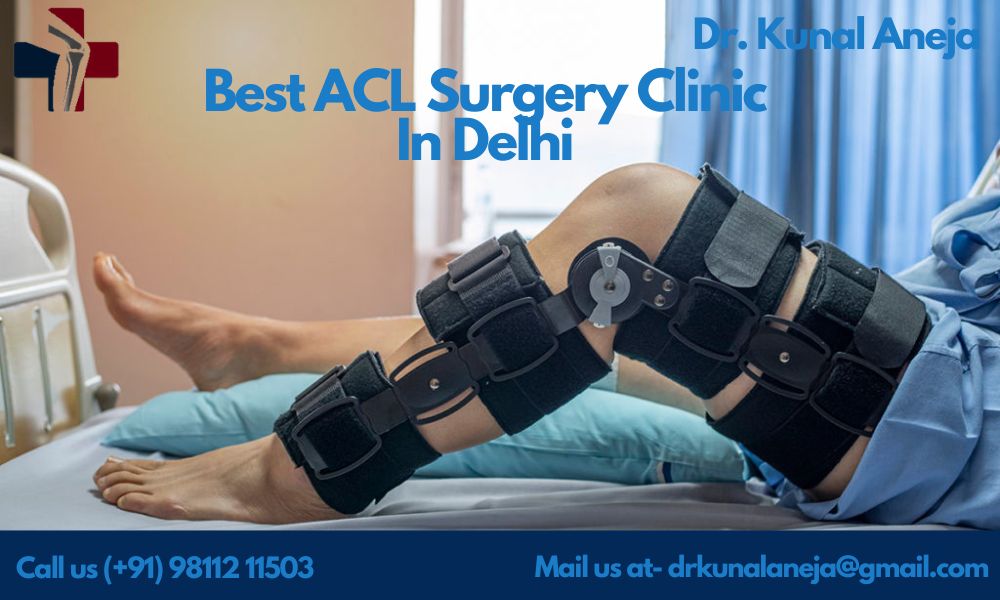
How much does ACL reconstruction surgery cost in India?
The cost of ACL reconstruction surgery in India can vary significantly based on several factors, ensuring each patient receives personalised care. Dr Kunal Aneja, a renowned orthopaedic surgeon in Delhi, focuses on optimising patient experience while considering the following factors that influence the cost:
- Type of Facility: The choice between public and private hospitals and the facility’s reputation and amenities can impact the cost.
- Surgeon’s Expertise: The surgeon’s experience and credentials, like Dr Aneja’s triple board certifications, can affect the surgical fees.
- Type of Graft: The choice between autografts (from the patient) and allografts (from a donor) can influence the overall cost.
- Hospital Stay: The duration of hospitalisation and the type of room chosen contribute to the final cost.
- Medications and Tests: Additional factors affecting the total expenses include post-surgery medications, diagnostic tests, and physical therapy.
- Geographic Location: Different cities within India have varying costs of living, which can impact the overall surgery expenses.
Dr Kunal Aneja ensures transparency in discussing costs and develops tailored treatment plans that align with each patient’s needs. His commitment to delivering high-quality care ensures patients receive value-driven outcomes in their journey to optimal joint health.
How to choose the best orthopaedic surgeon for ACL reconstruction?
Choosing the best orthopaedic surgeon for ACL reconstruction is a critical decision that directly impacts your outcome. Dr Kunal Aneja, an esteemed orthopaedic surgeon in Delhi, offers guidance on selecting the right surgeon:
- Credentials and Expertise: Look for surgeons with specialised training in orthopaedics, particularly ACL surgery. Dr Aneja’s triple board certifications and fellowship training exemplify expertise.
- Experience: Opt for surgeons with a substantial track record of performing successful ACL surgeries. Dr Aneja’s extensive training and global exposure ensure a wealth of knowledge.
- Reputation: Research patient reviews, referrals from peers, and any accolades the surgeon has received. Dr Aneja’s reputation as the “Best ACL surgeon in Delhi” speaks volumes.
- Communication Skills: Choose a surgeon who takes the time to understand your concerns, explain the procedure, and address your questions. Dr Aneja’s patient-centred approach fosters clear communication.
- Comprehensive Care: Consider surgeons who offer a holistic approach, from pre-operative assessment to post-operative rehabilitation. Dr Aneja’s commitment to personalised care stands out.
- Technology and Techniques: Opt for surgeons who stay updated with the latest advancements in ACL surgery. Dr Aneja’s expertise includes innovative techniques like robotic joint replacement.
Selecting the best orthopaedic surgeon, like Dr Kunal Aneja, ensures a partnership centred around expertise, transparency, and patient-centric care, facilitating a successful ACL reconstruction and optimal joint health.
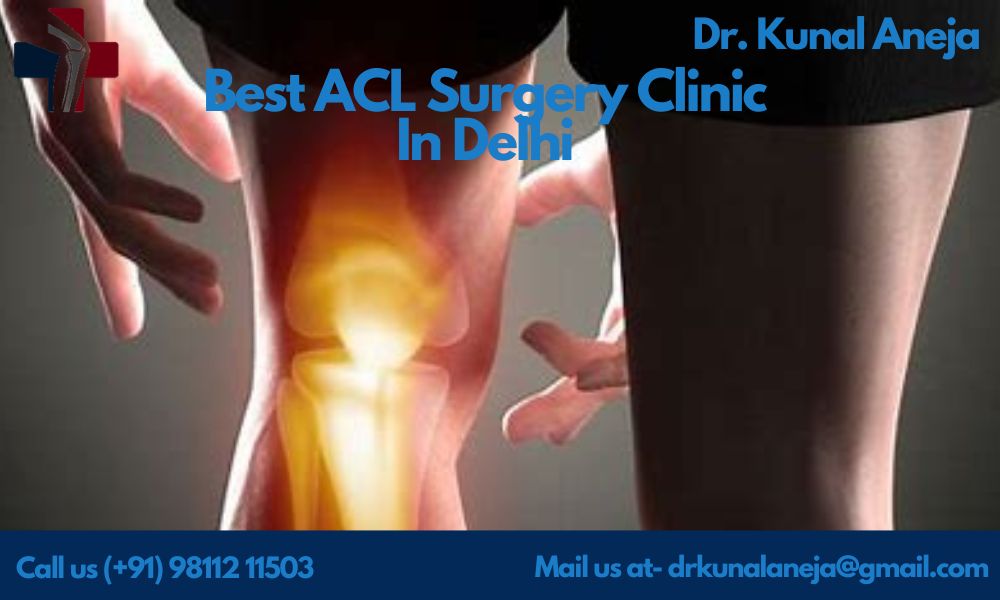
Dr Kunal Aneja’s distinction as the best ACL surgeon in Delhi is attributed to his exceptional qualifications, extensive experience, and patient-focused approach. Here’s why he stands out:
- Triple Board Certifications: Dr Aneja’s triple board certifications in orthopaedics, sports medicine, and joint replacement showcase his unparalleled expertise in the field.
- Fellowship Training: His fellowship training in robotic/navigational joint replacement and arthroscopy in prestigious international centres demonstrates his commitment to staying at the forefront of surgical advancements.
- Global Exposure: Having trained in Australia, the UK, Malaysia, Indonesia, Hungary, and India, Dr Aneja brings a diverse and enriched perspective to his practice.
- Editorial Roles: Serving as an editorial board member and reviewer for esteemed scientific journals highlights his dedication to research and innovation.
- Academic Excellence: Membership in various societies, fellowships, scholarships, and a Young Research Investigator Award underscore his literary contributions.
- Holistic Approach: Dr Aneja’s holistic approach to patient care, personalised treatment plans, and rehabilitation emphasises comprehensive well-being.
- Positive Impact: His passion for musculoskeletal health and positive impact on patient’s lives solidify his status as the best ACL surgeon.
Dr Kunal Aneja’s exceptional qualifications, commitment to cutting-edge techniques, and unwavering dedication to patient-centric care make him the ultimate choice for those seeking top-tier ACL surgery in Delhi.
What is Dr Kunal Aneja’s experience with ACL reconstruction surgeries?
Dr Kunal Aneja possesses extensive experience and expertise in performing ACL reconstruction surgeries. His distinguished career highlights his proficiency in this specialised field:
- Training: Dr Aneja’s comprehensive training includes triple board certifications in orthopaedics, joint replacement, and sports medicine, ensuring a well-rounded foundation.
- Fellowship: His fellowship training in robotic/navigational joint replacement and arthroscopy, acquired across renowned international centres, adds a global perspective to his skills.
- Surgical Precision: Dr Aneja’s meticulous surgical techniques are informed by his exposure to diverse surgical methodologies and innovative approaches.
- Complex Cases: His exposure to complex cases during his training and practice equips him to handle various ACL-related challenges.
- Research and Academics: Serving as an editorial board member and reviewer for esteemed journals reflect his academic prowess and dedication to staying updated.
- Positive Outcomes: Dr Aneja’s commitment to personalised patient care and surgical prowess have resulted in numerous successful ACL reconstructions.
With an emphasis on patient-centric care, innovative methodologies, and a commitment to optimal outcomes, Dr Kunal Aneja’s rich experience ensures that patients receive world-class ACL reconstruction surgeries tailored to their unique needs.
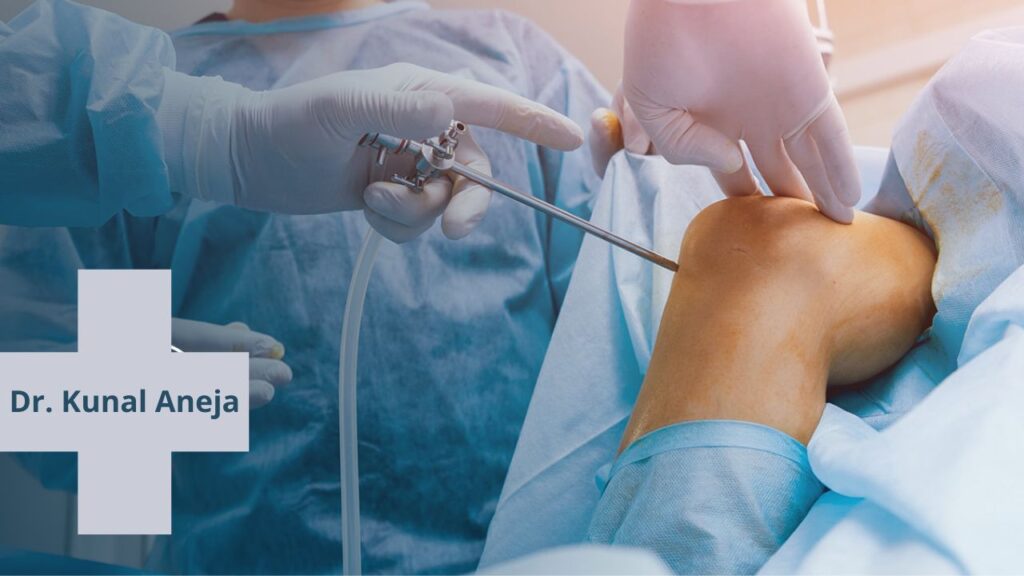
What techniques does Dr Kunal Aneja use for ACL reconstruction?
Dr Kunal Aneja employs advanced and innovative techniques for ACL reconstruction surgeries tailored to each patient’s individual needs:
- Robotic and Navigational Assistance: Dr Aneja’s extensive mechanical and navigational joint replacement training extends to ACL reconstruction, enhancing surgical precision and implant alignment.
- Anatomical Reconstruction: He emphasises anatomical graft placement, replicating the ACL’s natural attachment points and orientation for optimal stability.
- Individualised Graft Selection: Based on factors like patient age, activity level, and graft availability, Dr Aneja carefully selects the most appropriate graft type, autograft or allograft.
- Arthroscopic Approach: Dr Aneja employs minimally invasive arthroscopic techniques whenever possible, reducing surgical trauma and promoting quicker recovery.
- Double-Bundle Reconstruction: In complex cases, Dr Aneja may utilise double-bundle reconstruction to address both the anteromedial and posterolateral bundles of the ACL for enhanced stability.
- Comprehensive Rehabilitation: Dr Aneja’s holistic approach extends to post-operative care, where he crafts tailored rehabilitation plans to ensure complete recovery and a triumphant return to activities.
Dr Kunal Aneja optimises ACL reconstruction outcomes through his mastery of these techniques, empowering patients to regain knee stability, function, and mobility with the highest level of surgical precision.
How does Dr Kunal Aneja minimise pain after ACL surgery?
Dr Kunal Aneja employs a comprehensive approach to minimise pain after ACL surgery, enhancing patient comfort and facilitating a smooth recovery:
- Multimodal Pain Management: Dr Aneja adopts a multimodal pain management strategy that combines various techniques to control pain while minimizing the need for potent opioids effectively.
- Local Anaesthetics: He may use long-acting local anaesthetics during surgery to relieve immediate post-operative pain.
- Nerve Blocks: Peripheral nerve blocks or continuous catheters can numb the operative area and reduce pain sensation.
- Anti-Inflammatory Medications: Nonsteroidal anti-inflammatory drugs (NSAIDs) are employed judiciously to manage inflammation and pain.
- Customised Pain Medications: Dr Aneja tailors pain medication prescriptions to individual patient needs, ensuring optimal pain relief without unnecessary side effects.
- Early Mobilisation: Encouraging early movement post-surgery prevents stiffness and reduces discomfort.
- Physical Therapy: Dr Aneja’s rehabilitation plans include gentle exercises that reduce pain and promote healing.
- Patient Education: Dr Aneja educates patients about what to expect post-surgery, empowering them to manage pain and discomfort effectively.
By combining state-of-the-art pain management techniques with patient education and personalised care, Dr Kunal Aneja minimises pain after ACL surgery, optimising patient comfort during critical recovery.
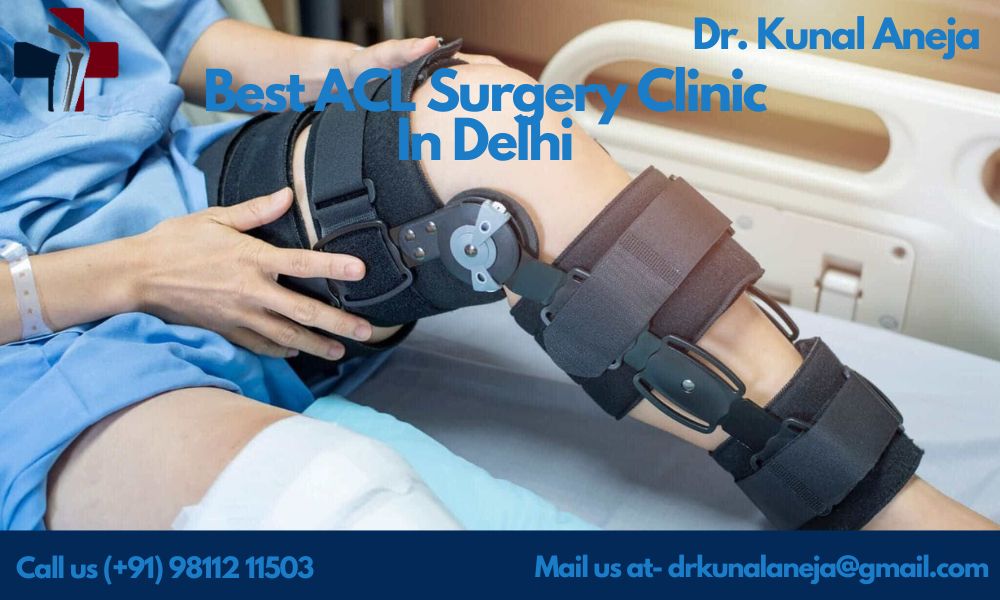
What is the success rate of Dr Kunal Aneja’s ACL surgeries?
Dr Kunal Aneja’s ACL surgeries boast a remarkable success rate owing to his exceptional expertise, meticulous surgical techniques, and patient-centred approach. While exact statistics may vary based on individual cases, Dr Aneja’s commitment to optimal outcomes is evident in his consistently high success rates:
- Experience: Dr Aneja’s extensive experience, including triple board certifications and fellowship training, equips him to handle a diverse range of ACL cases.
- Precision Techniques: His surgical precision, informed by global exposure and innovative methodologies, enhances graft placement and overall joint stability.
- Comprehensive Care: Dr Aneja’s holistic approach encompasses pre-operative assessment, surgical excellence, and personalised rehabilitation plans.
- Advanced Technology: Employing state-of-the-art technology like robotics and navigational assistance ensures optimal surgical outcomes.
- Patient Satisfaction: Positive patient testimonials and referrals underscore his commitment to patient-centric care and successful outcomes.
While multiple factors influence success rates, Dr Kunal Aneja’s dedication to excellence, advanced techniques, and comprehensive care converge to offer patients in Delhi and beyond the best chances for successful ACL surgeries and complete recovery.
How to get an appointment with Dr Kunal Aneja for ACL surgery in Delhi?
To secure an appointment with the esteemed orthopaedic surgeon Dr Kunal Aneja for ACL surgery in Delhi, follow these straightforward steps:
- Online Booking: Visit Dr Kunal Aneja’s official website at drkunalaneja.com to explore his expertise and services.
- Email Inquiry: Reach out via email to schedule an appointment. Send your inquiries to info@drkunalaneja.com or drkunalaneja@gmail.com. Briefly outline your situation and request a suitable appointment slot.
- Phone Contact: For direct communication, call +91-9811211503 or +91-9818548010, or reach the clinic at 011-27042222. The friendly staff can assist in booking your appointment.
- Emergency Contact: In emergencies, you can contact +91-9811211418 for prompt assistance.
By utilizing these contact methods, you can secure an appointment with Dr Kunal Aneja, renowned for his expertise in ACL surgery, and take the first step towards comprehensive care and optimal joint health in Delhi.
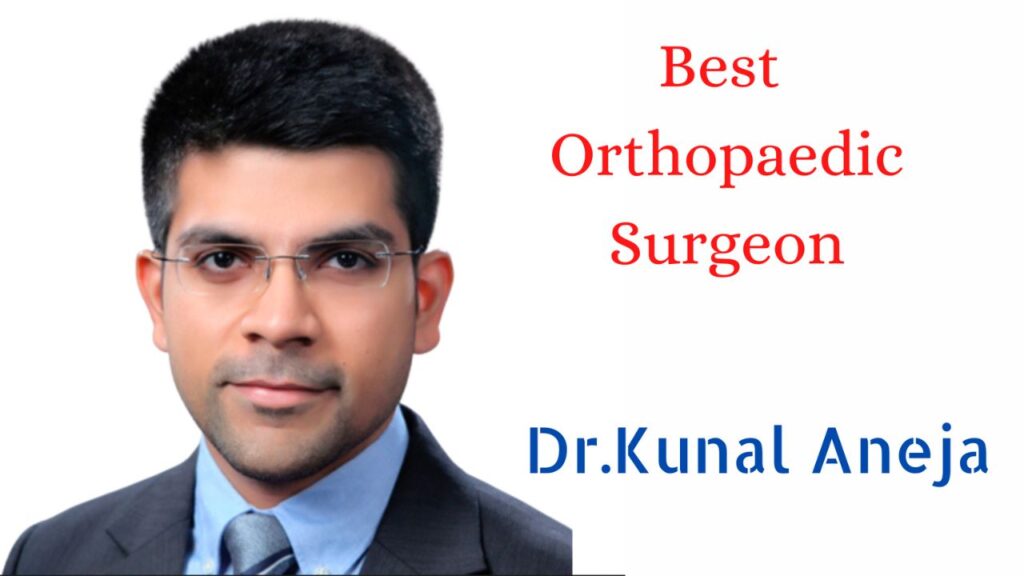
Conclusion
As the final stitch is placed, this journey culminates in the realisation that Dr Kunal Aneja isn’t just a surgeon; he’s a guardian of mobility, a sculptor of vitality, and a beacon of hope. With an unwavering commitment to healing and an unwavering passion for research, his legacy is etched in the stories of rejuvenated lives.
FAQs
What Does ACL Stand For?
ACL stands for Anterior Cruciate Ligament, a critical stabilising ligament in the knee joint.
Can ACL Injuries Heal on Their Own?
Minor sprains might heal with rest, but significant tears often require surgical intervention to recover fully.
How Long Does ACL Surgery Take?
The surgery usually takes 1-2 hours, but the overall process involves pre-operative preparation and post-operative recovery.
Is Dr. Kunal Aneja Available for Consultation?
Dr Aneja is available for consultation to discuss your joint health concerns and potential treatment options.
Are Robotic Joint Replacements Safe?
Yes, robotic joint replacements offer increased precision and better outcomes, with a strong safety track record.
These FAQs glimpse the wealth of information surrounding ACL surgery and Dr Kunal Aneja’s exceptional practice. To embark on your journey towards optimal joint health, seize the opportunity to consult with the best ACL surgeon in Delhi. Your mobility awaits – take the first step today.

